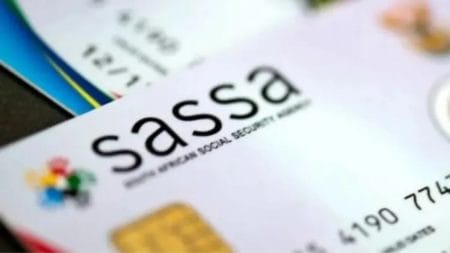Social grants in South Africa play a critical role in supporting millions of people in need. The South African Social Security Agency (SASSA) provides grants that assist low-income families, elderly citizens, and individuals with disabilities. While these grants are designed to provide much-needed relief, there are many myths and misconceptions surrounding them. These myths often fuel stigma and negative perceptions of grant recipients, making it more difficult for people to access the support they need.
In this article, we will debunk five of the most common myths about SASSA grants and set the record straight with facts and evidence.
1. Grants Make People Lazy and Dependent on the Government
A pervasive myth about SASSA grants is that they make people lazy and dependent on the government. This belief suggests that individuals who receive grants are less likely to work or improve their circumstances, as they are reliant on the government for financial support.
The Truth:
Research indicates that grants do not reduce motivation to work. In fact, many recipients of social grants continue to actively search for employment or use the assistance to support themselves while they work toward improving their financial situation. A study by the Human Sciences Research Council (HSRC) showed that there is little evidence to suggest that people who receive grants are less motivated to find work. For many grant recipients, the funds serve as a temporary safety net, helping them meet immediate needs like food and transportation while they look for employment.
Rather than encouraging laziness, SASSA grants provide crucial support during tough times, allowing people to work toward a more stable financial future.
2. The Child Support Grant Increases Teenage Pregnancy
Another myth that has been widely circulated is that the child support grant encourages teenage girls to get pregnant. According to this myth, young girls deliberately fall pregnant to gain access to government financial assistance, thus taking advantage of the system.
The Truth:
This myth is not backed by any credible evidence. In reality, very few teenage mothers actually qualify for or access the child support grant. According to a study by the South African Institute of Race Relations (SAIRR), the majority of child support grant recipients are in their 20s or 30s, not teenagers. Teenage pregnancy is a complex issue that is influenced by a range of factors, including social and economic pressures, lack of education, and limited access to healthcare.
The child support grant is designed to help children who are in need, regardless of the circumstances surrounding their birth. Rather than promoting teenage pregnancy, the grant helps provide a basic level of financial support to children living in poverty.
3. Parents Claim Grants for Children Who Don’t Live With Them
There is a common belief that many people fraudulently claim child support grants for children who do not actually live with them. This misconception assumes that caregivers are taking advantage of the system by falsely declaring children as dependents when they are not in their care.
The Truth:
In reality, more than 90% of children receiving child support grants live with the caregiver who claims the grant. SASSA works diligently to monitor and verify the legitimacy of grant claims. Regular checks are conducted to ensure that the child resides with the caregiver who is claiming the grant. While fraud may exist in any system, it is much less common than this myth suggests. Most caregivers who claim child support grants are genuinely looking after the children they are responsible for.
SASSA also has strict measures in place to detect and prevent fraudulent claims, ensuring that grants are distributed fairly and responsibly.
4. Recipients Misuse Grant Money
A common misconception about social grants is that recipients misuse the money, spending it on luxury items or non-essential goods. Some people believe that grant recipients squander their financial assistance on things like alcohol or cigarettes, rather than using the money to meet basic needs.
The Truth:
While some misuse of funds may occur, the overwhelming majority of grant recipients spend their money on essentials like food, healthcare, school fees, and transport. A study conducted by SASSA showed that most grant money is used to support basic living expenses and to care for children, elderly relatives, or disabled individuals. For many recipients, the grant is a vital lifeline that helps them cover essential costs and prevent deeper poverty.
Social grants are not a source of excess wealth, but rather a means to survive. Misuse of grant money is not the norm, and most recipients are deeply committed to using the funds for the well-being of their families.
5. SASSA Payments Are Always Made on the Same Date Each Month
A common misunderstanding is that SASSA payments are always made on the same date each month. Many people expect payments to be made on a specific day, and any deviation from that date is often seen as a sign of problems with their application.
The Truth:
In practice, payment dates can vary from month to month due to several factors. These factors include weekends, public holidays, and the time it takes to process and verify grant payments. If a payment date falls on a weekend or public holiday, beneficiaries may receive their grants a day earlier or later than expected. Late payments do not necessarily indicate that there is an issue with the application or that there is a problem with the grant.
SASSA works to ensure that payments are made as efficiently as possible, but external factors can sometimes cause delays. Beneficiaries are encouraged to rely on official communication channels, such as the SASSA website or customer care centers, to get accurate information about payment dates.
Additional Myths to Consider
There are several other myths surrounding SASSA grants that need clarification. For example, some people believe that appeals for rejected grants are always approved. While many appeals are successful, each case is reviewed individually, and not all appeals result in approval. Similarly, some people think that one cannot receive multiple grants simultaneously, which is not true. In certain circumstances, beneficiaries may qualify for more than one grant, such as a child support grant and an old age pension.
Check also: What to Do if Your SASSA Grant is Paid into the Wrong Bank Account
It’s crucial to address and dispel the myths and misconceptions surrounding SASSA grants. These grants provide essential support to millions of South Africans who are facing financial hardship. By debunking these common myths, we can reduce the stigma and ensure that those who need assistance are able to access the support they deserve.
SASSA urges beneficiaries to rely on official sources of information to avoid panic and confusion, particularly when misinformation is circulating on social media. By understanding the truth about social grants, we can foster a more compassionate and informed society that recognizes the importance of these safety nets for vulnerable individuals and families.










